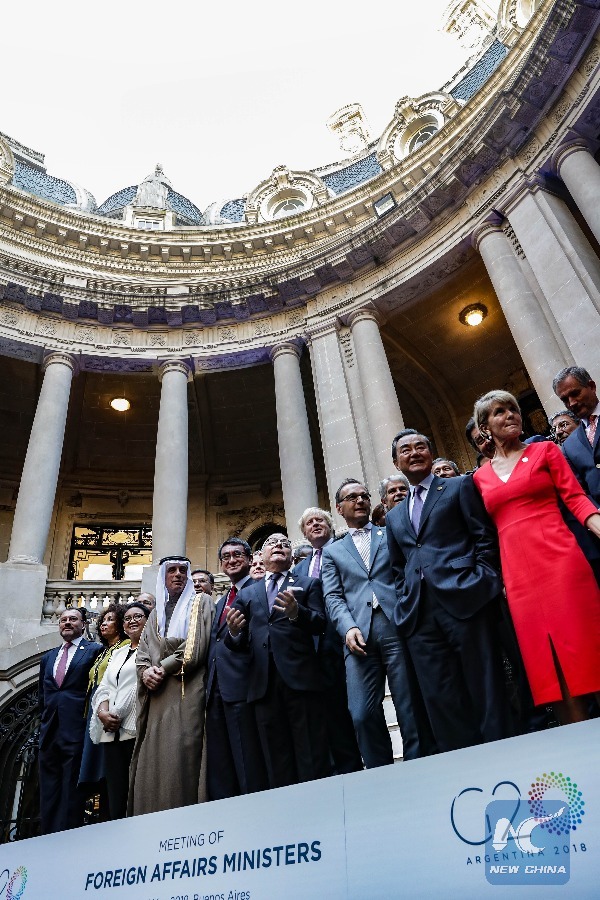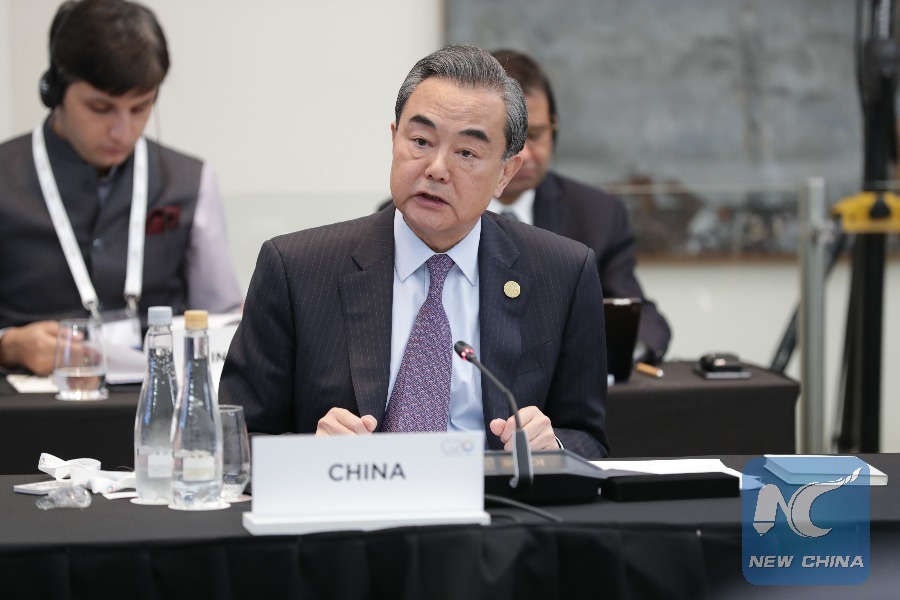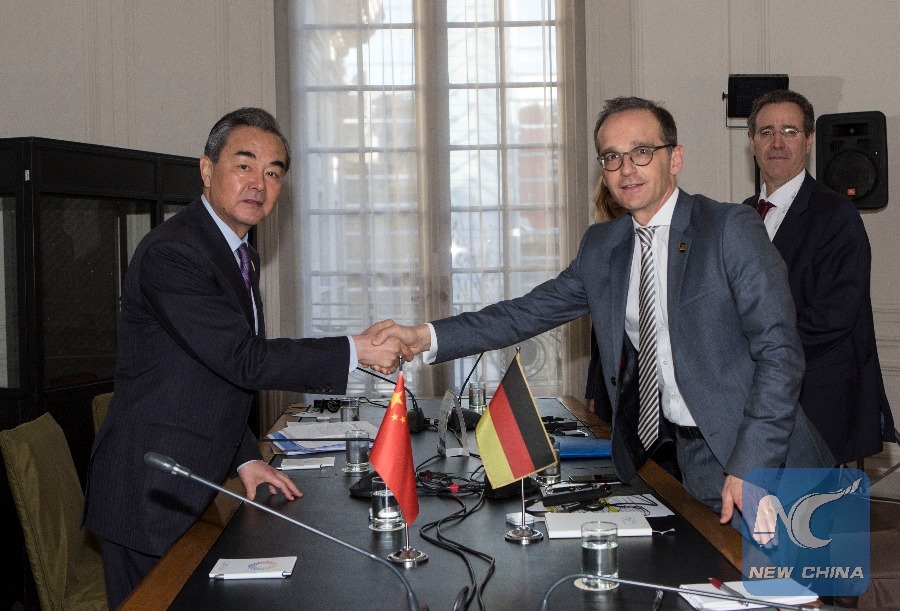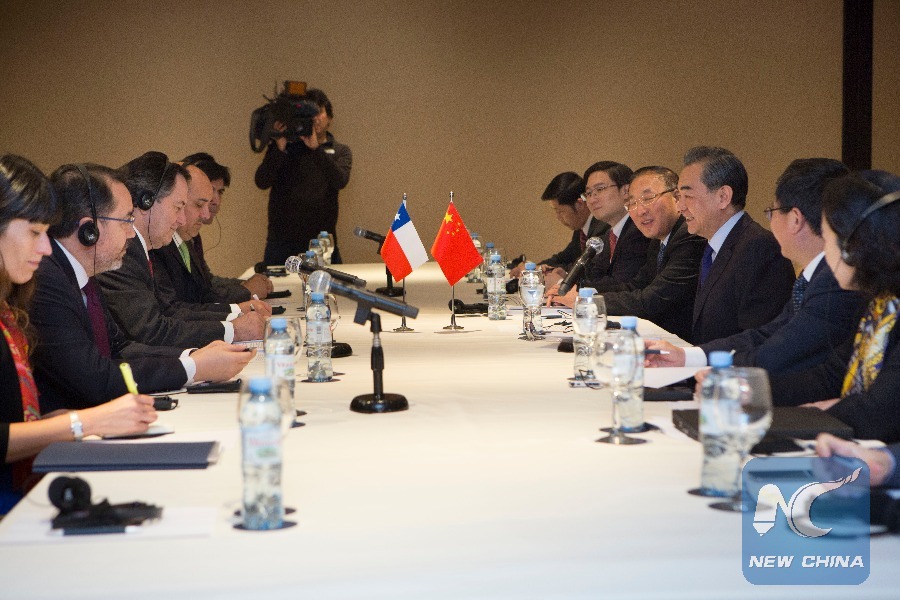
Chinese State Councilor and Foreign Minister Wang Yi (3rd R F) attends the G20 foreign ministers' meeting in Buenos Aires, Argentina, May 21, 2018. (Xinhua/Martin Zabala)
BUENOS AIRES, May 22 (Xinhua) -- The foreign minister of Argentina, the chair country of the Group of 20 (G20) this year, announced a consensus on the need for multilateralism to face global challenges when summing up the G20 ministerial meeting just concluded here.
Multilateralism and global governance as well as fair and sustainable development, the topics tabled by Argentina, are viewed as crucial by many countries, including China, and observers as the world is facing protectionism and other common international challenges.
NEED TO UPHOLD MULTILATERALISM
"Multilateral organisms have to respond, to provide guidance which allow us to work towards an inclusive consensus," Argentine Foreign Minister Jorge Faurie said at a press conference.
"All of us have agreed that it is better to have and preserve multilateralism," he added.
Noting that the G20 itself is a manifestation of multilateralism and an important reform of global governance, Chinese State Councilor and Foreign Minister Wang Yi said that discussing multilateralism and global governance is of great importance as the G20 summit enters its 10th year.
Upholding multilateralism, improving global governance and building a community of shared future for mankind accord with the trend of the times and the common interests of all nations, said Wang.

Chinese State Councilor and Foreign Minister Wang Yi addresses the G20 foreign ministers' meeting in Buenos Aires, Argentina, May 21, 2018. (Xinhua/Martin Zabala)
The Chinese stance on multilateralism agreed with the G20 topics and met with support from other ministers and observers.
In a bilateral meeting with Wang on the sidelines of the G20 meeting, Faurie said Argentina and China have a consensus with regard to the firm safeguarding of multilateralism.
Almost all nations "have expressed solidarity that there is no alternative to multilateralism, that it should be enhanced or the potential for conflicts will increase," Russian Deputy Foreign Minister Alexander Pankin was quoted by Russian media as saying in the Argentine capital.
Marcelo Fernandez, Ecuador's former deputy minister of foreign affairs, agreed that "all world affairs must be resolved on the basis of multilateral relations, which do not imply isolation or the isolated aspirations of any given country."
RULE-BASED GLOBAL GOVERNANCE
Commenting on G20 topics, Gustavo Girado, an expert on contemporary Chinese studies at the National University of Lanus in Argentina, said that multilateralism and global governance have been weakened in recent years, mainly by Western powers.
During the G20 ministerial meeting, Wang underlined the important roles of international platforms such as the G20, the United Nations (UN) and the World Trade Organization (WTO) in managing crucial international issues and disputes through dialogue and consultations.
He said that the G20 embodies progress in global governance and the group should play a better role in promoting economic globalization while the United Nations is the core of the current multilateral mechanism and the purposes and principles of the UN Charter form the cornerstone of contemporary international relations.
As for the WTO, Wang said it represents the rule-based multilateral trade system, and its core values and basic principles must be respected.
In Girado's eyes, China has long defended the rule-based global governance and wants to see a return to the types of discussions that originally gave rise to the G20.

Chinese State Councilor and Foreign Minister Wang Yi (L) meets with German Foreign Minister Heiko Maas in Buenos Aires, Argentina, May 21, 2018, on the sidelines of the G20 foreign ministers' meeting. (Xinhua/Martin Zabala)
Germany holds a similar stance to China. Heiko Maas, foreign minister of Germany who presided over the G20 last year, said that his country was also in favor of "an international system based on rules, implied by the efficiency of the dispute resolution mechanism of the World Trade Organization."
He added that "voices who speak up in favor of isolation and of closing off trade are a great source of worry."
FAIR, SUSTAINABLE DEVELOPMENT
Though a lot of problems facing the world today are essentially related to development, the imbalance between developed and developing countries has not seen a fundamental change, Wang said at the meeting, calling on the group to create more opportunities and support for developing countries.
During a bilateral meeting with Wang, Chilean Foreign Minister Roberto Ampuero expressed his appreciation of China's role in safeguarding free trade and an open world economy, saying it's also an important cornerstone for Chile's diplomatic policy.

Chinese State Councilor and Foreign Minister Wang Yi (3rd, R) meets with his Chilean counterpart Roberto Ampuero (3rd, L) during the ministerial meeting of the Group of 20 (G20) in Buenos Aires, capital of Argentina, May 20, 2018. (Xinhua/Martin Zabala)
Ampuero is one of several ministers who discussed bilateral ties as well as economic and trade cooperation with the Chinese delegate here, in which the China-proposed Belt and Road Initiative (B&R) played an important role.
In order to jointly enhance support for developing countries, Wang said China, the world's biggest developing country, is expecting more cooperation with other G20 members on the B&R, which supports infrastructure construction and interconnectivity across the globe.
Addressing China's aspiration of creating a community of shared future for mankind, Milton Reyes, coordinator of the Chinese Studies Center at Ecuador's Institute of Advanced National Studies, said the country remains pragmatic.
China "aims at a new kind of relations to realize a multilateral world, which is governed by the international laws of the UN but respecting the individuality of each nation," Reyes said.
He said that China is contributing to the common development of the whole world while making great achievements in its own development.
He said that countries with a great industrial and productive capacity have the shared responsibility to ensure globalization and the opening of markets to continue benefiting both developed and developing countries.
"We stick to reform, expand opening-up, implement people-centered development ideas, and always remain a builder of world peace, a contributor to global development, as well as a defender of international order," Wang said at the meeting.

